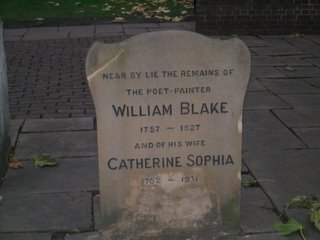 Vision for the Ordinary
Vision for the OrdinaryWe have contended that one of the secrets to F W Boreham’s success as a writer and speaker was that he spoke about ordinary things and made them glow.
This is the fourth article in a series which looks at exponents of the ordinary who used various media to get across their message. This posting looks at the influence of William Blake on F W Boreham.
Glorying in the Commonplace
F W Boreham honoured William Blake “as one of the purest poets, one of the most eminent painters and one of the most cunning engravers of all time ... [who] deserves to be esteemed as the peak and pinnacle of the rennaissance in our literature”.[1] Like Dickens and Turner, the endearing gift according to Boreham, was the way Blake so quickly “saw the glory of common things”,[2] and his ability in which, even when looking at the drabness and squalor of London, he “saw the best shining through the worst”.[3] Boreham, with the perspective of history, hailed Blake as a seer, a prophet and a philosopher.[4] According to Boreham, Blake displayed “the most perfect blend of simplicity with sublimity” which was found in literary records. Of Blake, he said: “To him every common object was transfused with radiant splendour; every crust of bread was sacramental; every cup of cold water that he lifted to his lips was, to him, the Holy Grail. He hardly wrote a line that a little child could fail to understand; yet his crystal clear conceptions are shot through with a gorgeous imagery that for beauty has been unsurpassed”.[5]
Simplicity Without Clutter
Boreham attributed Blake’s simple style to the simplicity of his life when saying, “He was a simple soul. He mingled with simple folk, cultivated simple ways, developed simple tastes, and expressed himself in a simple phraseology”.[6] Boreham deduced that Blake’s simplicity led to a depth of vision and he inferred that the embracing of an uncluttered lifestyle was conducive to the cultivation of pure vision.
Writing amidst the depression of the 1930s, Boreham asked, “Is it too much to hope that it is because our own generation is turning with renewed relish to life’s simpler and sweeter delights that it is discovering a new charm in the minstrelsy of this clear, pure singer of two hundred years ago?”[7]
Life Responding to Life
It has been noted that Boreham attributed the immediate, positive response towards Charles Dickens and Joseph Turner to the fact that their artistry reflected ordinary life and that they gloried in the common things. Accordingly, one would anticipate that Boreham would be swift to find further vindication for artists of the ordinary in the response to the output of William Blake. However, the poet was not lauded in his day, nor was his greatness recognised. Boreham lamented the poor response by Blake’s generation but did not perceive his inconsistency when recording that Blake’s artistry did not illustrate the principle of life responding to life. While Blake’s contemporaries viewed him as an enigma, Boreham commented in 1931, “It is pleasant to notice the growing disposition of our own generation to atone for the neglect and disdain of his unappreciative contemporaries”.[8]
Geoff Pound
Image: I took this photo last week of Blake’s gravestone in the Bunhill Fields cemetery in central London. The photograph is dark because the sky was dark when I took it at 3.30pm!!
[1] F W Boreham, Mercury, 26 November 1949.
[2] Boreham, Mercury, 17 October 1931.
[3] Boreham, Mercury, 28 November 1942.
[4] Boreham, Mercury, 17 October 1931.
[5] Boreham, Mercury, 26 November 1949.
[6] Boreham, Mercury, 28 November 1942.
[7] Boreham, Mercury, 17 October 1931.
[8] Boreham, Mercury, 17 October 1931.


